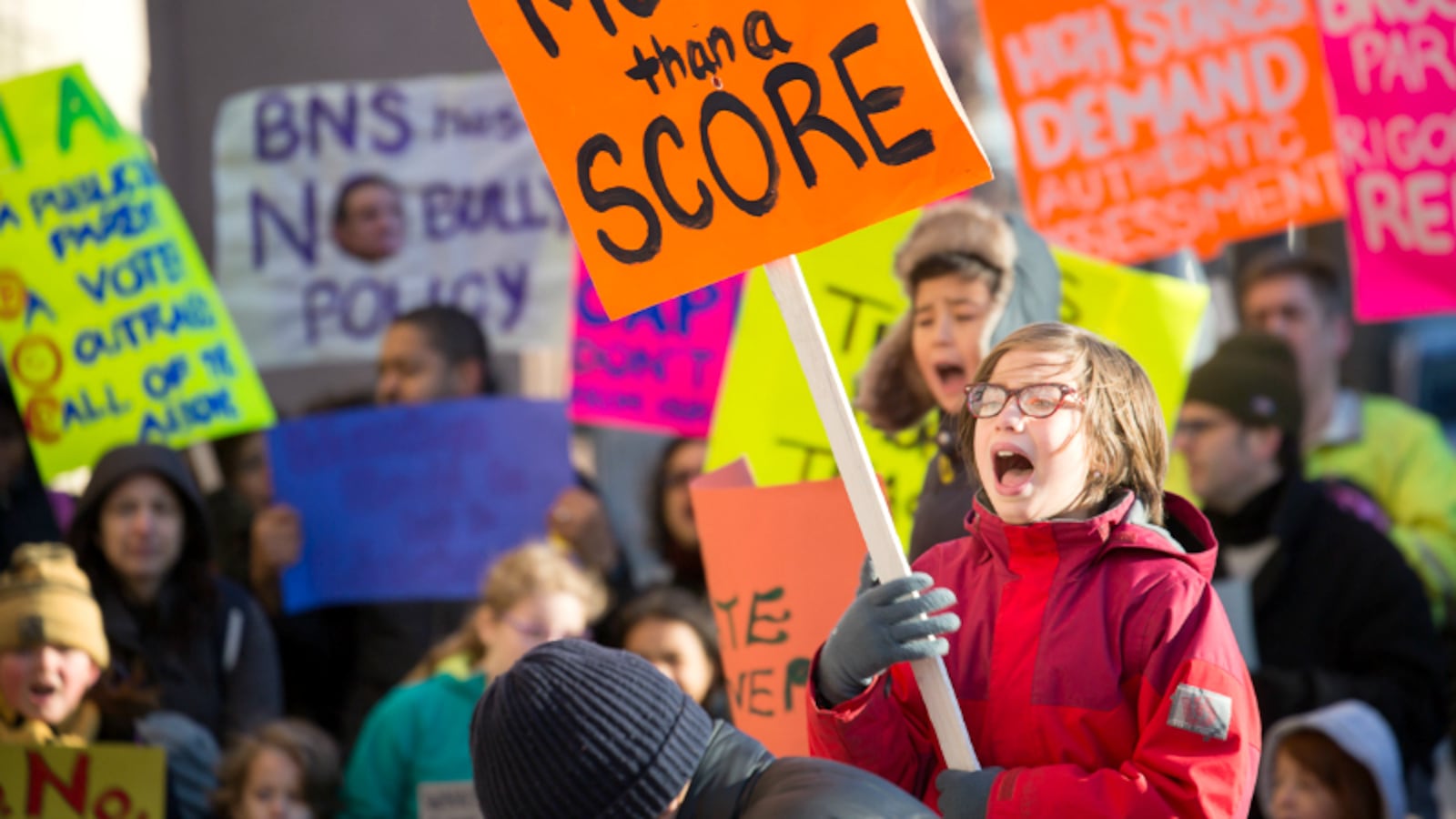The parents who organized a record-breaking boycott of state tests last year say the commissioner’s latest effort to alter state tests is not nearly enough.
In response to widespread criticism of state assessments, Commissioner MaryEllen Elia last week announced several changes to the state’s testing program. Those changes include giving more educators a role in drafting tests and reducing test pressure and length— key goals of the “opt-out” movement — by reducing the number of questions and letting students take as long as they need to finish.
But opt-out leaders said what appears to be a major policy shift is really a set of minor tweaks designed to appease parents without addressing the concerns that caused 20 percent of them to have their children sit out last year’s exams. Without further changes, opt-out leaders say they will continue to convince parents across the state not to let their children take the tests.
“It’s the non-change changes,” said Lisa Rudley, a founding member of the New York State Allies for Public Education, about the testing concessions Elia made last week. Elia “is still talking about it as if the tests are all good and it’s really a communication problem,” Rudley said.
The commissioner’s policies are based on conversations with thousands of New Yorkers and consistent with the recommendations in Gov. Andrew Cuomo’s Common Core task force report, according to state education department officials. They said it would be a mistake to move more quickly.
“These are just some of the steps the Regents and the commissioner are taking to ensure our students receive the education they’re entitled to,” said Jonathan Burman, a spokesman for the state education department. “This is critically important work and we will take the necessary time to make sure we listen and get it right.”
Opt-out leaders said each of the changes Elia announced last week falls short of what’s needed.
Giving students unlimited time runs counter to opt-out’s goal of reducing the duration of tests, Brooklyn teacher Jessica Klonsky said on Facebook in response to a Chalkbeat story about the changes.
“This is a pretty useless response to the opt-out movement,” Klonsky wrote. “People were not opting their children out of the tests because they didn’t have enough time to take them. They opted out because the tests and their preparation take up too much time as it is. Now they are going to take up more time!”
Unlimited time on tests could make for a logistical nightmare, said Michael Reilly, the president of Community Education Council 31 in Staten Island who has advertised his own decision to opt his children out of state tests and has applied for the open at-large seat on the Board of Regents. If some students are still working while others are finished, teachers will have to oversee both groups of students and find a quiet place for students still taking the test, he said.
Eliminating a few test questions is a small dent in a system that forces elementary school students to take six full days of exams, Rudley said. Instead, she said she would like to see only one day of testing for each subject with about 45 minutes for each test.
And Reilly noted that while educator involvement is a good thing, the state’s guidance is not specific about how many teachers will work to revamp each test.
“I think she’s trying to put a bandaid on the issues that parents and educators have raised,” Reilly said. “This is one attempt to appease parents. Unfortunately, I don’t think it’s well thought out.”
The movement is finding an ally in the state teachers union, which is also pressing Elia to move more quickly in overhauling the state’s testing program. In a letter sent Friday, NYSUT urged Elia to reduce the number of days dedicated to testing and push the tests later in the school year.
“The department should not pass up this opportunity to make meaningful change in the testing system and restore the confidence of teachers, parents, and students,” reads the letter, signed by NYSUT Vice President Catalina Fortino.
Not everyone is a harsh critic of Elia’s policies. Many defended her testing changes as the first steps towards broader reform.
Bob Lowry, deputy director of the New York State Council of School Superintendents, said most superintendents believe Elia’s announcement is a “good faith effort” to change broken testing practices and that moving any faster would be dangerous.
“We got into all these things over a period of years, in part, by rushing into things,” Lowry said about the current state tests, “so let’s not make the same mistake in trying to repair the damage caused by our earlier mistakes.”
Jay Worona, the deputy executive director and general counsel for the New York State School Boards Association, said both the commissioner’s defense and the opt-out leaders’ reactions are understandable.
“The commissioner is saying, ‘Please work with me. Don’t assume that the status quo is going to be preserved forever,’” Worona said. On the other hand, the opt-leaders and supporters are thinking, “If we don’t keep this pressure on, we don’t really believe that these changes are going to occur,” he said.
Indeed, opt-out leaders have pledged to keep fighting until state tests meet their standards.
“Parents will not be opting back in until the tests are appropriate,” Rudley said. “Parents will still continue to opt out.”

